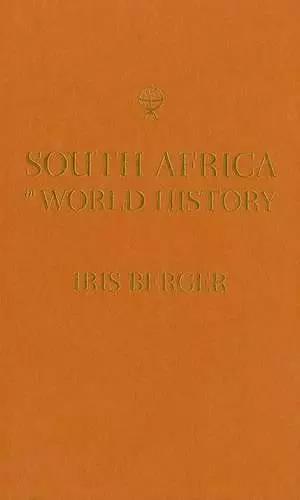South Africa in World History
Format:Hardback
Publisher:Oxford University Press Inc
Published:5th Nov '09
Currently unavailable, and unfortunately no date known when it will be back
This hardback is available in another edition too:
- Paperback£25.99(9780195337938)

This volume begins in the early centuries of the Common Era with the various groups of people who had settled in southern Africa.. Stone Age foragers, farmers with iron technology, and pastoralists all interacted to create a complex society before Europeans arrived. In the seventeenth century, Dutch settlers developed a colonial society based on the menial labor of indigenous inhabitants of the Cape and slaves imported from the East Indies and other parts of Africa. British conquest in the early nineteenth century brought an end to slavery, as well as new forms of colonial domination, tension between the British and the original Dutch settlers, armed struggle between expanding European communities and Africans (including the highly militarized Zulu kingdom), and intensive missionary activity that transformed many African societies. The discovery of diamonds and gold in the late nineteenth century brought industrialization based on migrant labor, new clashes between British and Africaaners, the final conquest of African societies, and new European migrants. During the twentieth-century, despite further economic development, African communities were increasingly impoverished. New forms of racial domination lead to the implementation of apartheid in 1948 and heightened political organizing among both African and Africaaner nationalists. The intensification of resistance in the 1970s and '80s coupled with drastic changes in the international balance of power brought an end to the apartheid state in 1994 and an intensified struggle to overcome apartheid's economic and political legacy by building a new nonracial society. The book emphasizes social and cultural history, focusing on people's interactions and identities according to race, class, gender, religion and ethnicity. It also addresses changes in literature (both oral and written), music, and the arts and draws on the extensive biographical and autobiographical literature to provide a personal focus for the discussion of major themes. While this emphasis reflects dominant trends in historical scholarship for the past two decades, it also includes recent material on environmental history and relationships between African Americans and South Africans. Where relevant, it highlights comparisons between South African and U.S. history.
"Berger's book...is fully cognisant of the latest research and written with verve and clarity. More than any of its competitors, it skilfully uses individual stories and episodes to convey the complexity of life in South Africa...This history is lively and poignant."--Kronos
ISBN: 9780195157543
Dimensions: 155mm x 236mm x 15mm
Weight: 476g
208 pages